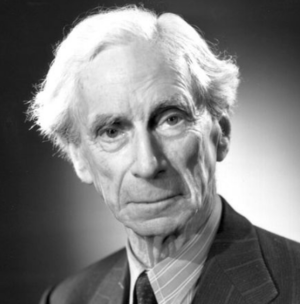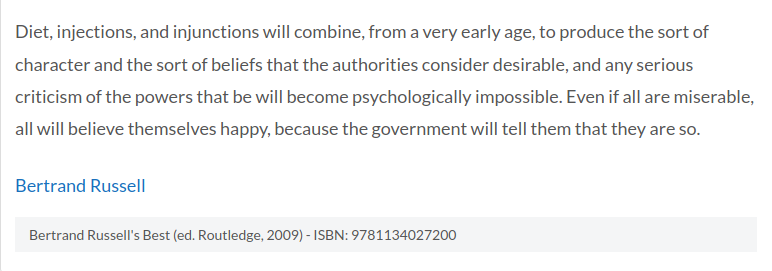Bertrand Russell
( Philosopher, Propagandist, Peace activist) | |
|---|---|
 | |
| Born | Bertrand Arthur William Russell 18 May 1872 Trellech, Monmouthshire, United Kingdom |
| Died | 2 February 1970 (Age 97) Penrhyndeudraeth, Wales, United Kingdom |
| Nationality | British |
| Alma mater | Trinity College (Cambridge) |
| Spouse | Alys Pearsall Smith |
| Founder of | Campaign for Nuclear Disarmament, Pugwash Conferences |
| Member of | Coefficients (dining club), Fabian Society |
| Interests | People's Tribunal |
| Interest of | Ralph Schoenman |
UK philosopher and pacifist | |
Bertrand Arthur William Russell, 3rd Earl Russell, was a British philosopher, logician, mathematician, historian, writer, social critic, political activist and Nobel laureate. At various points in his life he considered himself a liberal, a socialist, and a pacifist, but he also admitted that he had "never been any of these things, in any profound sense". He was born in Monmouthshire into one of the most prominent aristocratic families in the United Kingdom.
Contents
Activities
Russell Tribunal
In 1966 he organised the Russell Tribunal (also known as the International War Crimes Tribunal, Russell-Sartre Tribunal, or Stockholm Tribunal), which was a private People's Tribunal organised in cooperation with French philosopher and writer Jean-Paul Sartre, with Lelio Basso, Simone de Beauvoir, Vladimir Dedijer, Ralph Schoenman, Isaac Deutscher and others. The tribunal investigated and evaluated American foreign policy and military aggression in Vietnam. Other tribunals were organised in it's image.
Opinions
The Impact of Science on Society (1952)

Resources
- Andrew G. Bone Bertrand Russell as cold war propagandist
(The Bertrand Russell Society Quarterly February-May 2005 / Numbers 125-126, BERTRAND RUSSELL AND THE COLD WAR.)
Events Participated in
| Event | Start | End | Location(s) | Description |
|---|---|---|---|---|
| 1948 Hague Congress | 7 May 1948 | 11 May 1948 | Netherlands The Hague | Landmark conference which had a profound influence on the shape of the European Movement. Many of the groups organizing the conference received covert funding from the CIA. |
| Congress for Cultural Freedom/Founding Conference | 26 June 1950 | 29 June 1950 | Founded the Congress for Cultural Freedom. The participants had a "a culpable incuriosity about funding" of the luxurious conference, which was later exposed as CIA money. |
References
- ↑ The Impact of Science on Society , 1952